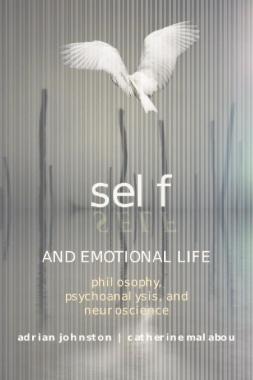Adrian Johnston and Catherine Malabou defy theoretical humanities' deeply-entrenched resistance to engagements with the life sciences. Rather than treat biology and its branches as hopelessly reductive and politically suspect, they view recent advances in neurobiology and its adjacent scientific fields as providing crucial catalysts to a radical rethinking of subjectivity.
Merging three distinct disciplines—European philosophy from Descartes to the present, Freudian-Lacanian psychoanalysis, and affective neuroscience—Johnston and Malabou triangulate the emotional life of affective subjects as conceptualized in philosophy and psychoanalysis with neuroscience. Their experiments yield different outcomes. Johnston finds psychoanalysis and neurobiology have the potential to enrich each other, though affective neuroscience demands a reconsideration of whether affects can be unconscious. Investigating this vexed issue has profound implications for theoretical and practical analysis, as well as philosophical understandings of the emotions.
Malabou believes scientific explorations of the brain seriously problematize established notions of affective subjectivity in Continental philosophy and Freudian-Lacanian analysis. She confronts philosophy and psychoanalysis with something neither field has seriously considered: the concept of wonder and the cold, disturbing visage of those who have been affected by disease or injury, such that they are no longer affected emotionally. At stake in this exchange are some of philosophy's most important claims concerning the relationship between the subjective mind and the objective body, the structures and dynamics of the unconscious dimensions of mental life, the role emotion plays in making us human, and the functional differences between philosophy and science.
- Contents
- Preface: From Nonfeeling to Misfeeling - Affects Between Trauma and the Unconscious
- Acknowledgments
- PART I. Go Wonder: Subjectivity and Affects in Neurobiological Times
- Introduction: From the Passionate Soul to the Emotional Brain
- 1. What Does "Of" mean in Descartes's Expression, "The Passion Of the Soul"?
- 2. A "Self-Touching You" : Derrida and Descartes
- 3. The Natural Self: DeMasio Meets Descartes
- 4. Affects Are Always Affects of Essence: Book 3 of Spinoza's Ethics
- 5. The Face and the Close-Up: Deleuze's Sponozist Approach to Descartes
- 6. Damasio as a Reader of Spinoza
- 7. On Neural Plasticity, Trauma, and the Loss of Affects
- Conclusion
- PART II. Misfelt Feelings: Unconscious Affect Between Psychoanalysis, Neuroscience, and Philosophy
- 8. Guilt and the Feel of Feeling: Toward a New Conception of Affects
- 9. Feeling Without Feeling: Freud and the Unresoved Problem of Unconscious Guilt
- 10. Affects, Emotions, and Feelings: Freud's Metaphsychologies of Affective Life
- 11. From Signifiers to Jouis-Sens: Lacan's Senti-ments and Affectuations
- 12. Emotional Life After Lacan: From Psychoanalysis to the Neurosciences
- 13. Affects Are Signifiers: The Infinite Judgment of a Lacanian Affective Neuroscience
- Postface: The Paradoxes of the Principle of Constancy
- Notes
- Index

